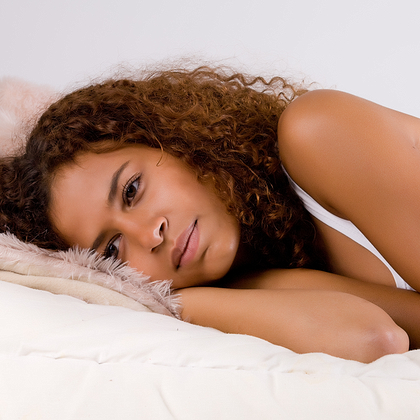
Shutterstock
It never failed.
For about a week and a half straight, despite my box fan blowing like the big bad wolf and me simply wearing a sleep dress to bed, I woke up in the middle of the night drenched in sweat. I’m talking about the kind of sweat where you have to get up at 3 or 4 a.m. and clean yourself up. Dry off and then change into a completely different set of pajamas, hoping you won’t wake up in the same situation before it’s time for work.
I was initially pretty worried that something was going on with me, my rest being interrupted by the feeling that I was lying in a pool of of chilled water (the fan caused it to feel especially frigid). But after leaving my extra thick comforter at the foot of my bed and trying a different, lighter pair of sheets, I started to have a more sound sleep. And yes, I woke up dry and comfortable, still wearing the same sleep dress or shirt I went to bed in.
And it’s these slight adjustments you should take into account before you think the worst, according to Shape. They spoke to Jennifer Caudle, a board-certified family physician and the assistant professor at Rowan University’s School of Osteopathic Medicine. She told the publication that if you’re an otherwise healthy woman, your issue is likely an “environmental” one. Your room is too warm, your bed is covered in stifling blankets, you ate something hot/spicy before going to bed, or you exercised, increasing your body temperature and throwing off your rest.
Caudle also pointed out that certain medications could be causing night sweats, from birth control and antidepressants to cholesterol-lowering drugs and hormone therapy.
But it might be time to see a doctor when your best efforts to change things up still leave you waking up drenched. The American Osteopathic Association has said that a test of your blood count and thyroid could help a physician figure out if there is an underlying medical condition causing your consistent night sweats. Such possible reasons according to the AOA include: issues with anxiety; a hormonal disorder where too much or too little of a hormone is causing you to be flushed and sweat profusely; chronic sweating that doesn’t have anything to do with environmental or medical issues; a bacterial infection (including the possibility of tuberculosis); low blood sugar, otherwise known as hypoglycemia; cancer, which heavy night sweats can be an early indicator of, and, of course, menopause (symptoms can start in your mid-30s), which brings about hot flashes during the day and night.
Still, do what you can to change your environment before you think the worst. Sometimes our cotton pajamas can be a little too warm, or that cool breeze we leave the window open for is just not cooperating some nights. Or maybe you need to invest in a cooling pillow? Whatever changes you decide to make, hopefully such improvements will help you and bring about a (dry) good night’s rest.









